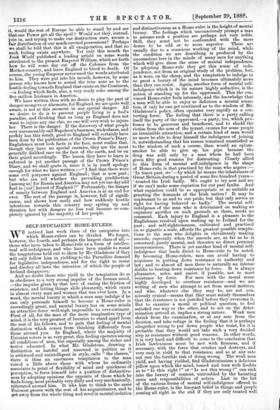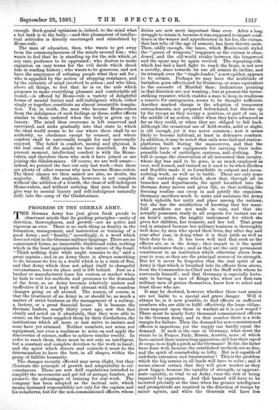SELF-INDULGENT HOME-RULERS.
WE noticed last week three of the categories into which Home-rulers can be divided. We forgot, however, the fourth, and perhaps the largest class of all,— those who have taken to Home-rule as a form of intellec- tual self-indulgence, and who have been unable to resist the temptations held out to them by Mr. Gladstone if they will only follow him in yielding to the Parnellite demand for legislative independence, and for the right to resist and disobey all laws the intention of which the people of Ireland disapprove. And no doubt those who yield to the temptation do so in obedience to a very strong impulse of the human mind, —the impulse given by that love of easing the friction of existence, and letting things slide pleasantly, which exists in almost every man and woman that was ever born. In a word, the mental luxury in which a man may indulge if he can only persuade himself to become a Home-ruler is exceedingly great, and mental luxury has on some minds an attractive force well-nigh impossible to over-estimate. First of all, for the man of the more imaginative type of mind, it is the very greatest of luxuries to stand apart from the rest of his fellows, and to gain that feeling of mental distinction which comes from thinking differently from those around you. In England, where the, majority of Unionist voters is so very great, this feeling operates among all conditions of men, but especially among the richer and better educated. In what Mr. Gladstone, drawing a distinction as hateful and unsound in politics as it is awkward and unintelligent in style, calls " the classes," there is thus an enormous temptation to the man raised a little above those with whom he ordinarily associates in point of flexibility of mind and quickness of perception, to force himself into a position of distinctive- ness by adopting opinions the opposite of those which he finds being, most probably very dully and very mechanically, reiterated around him. It irks him to think in the same Unionist groove with the rest of his acquaintances, and to get away from the whole thing and revel in mental isolation and distinctiveness as a Home-ruler is the height of mental luxury. The feelings which unconsciously prompt a man to assume such a position are perhaps not very noble. Still, they must not be confounded with the mere desire to be odd or to seem superior. These are usually due to a conscious working of the mind, while the condition we are describing is produced by the unconscious love in the minds of many men for anything which will give them the sense of mental independence. In adopting Home-rule they get this sense of inde- pendence, not from an original study of the problem, but, as it were, on the cheap, and the temptation to indulge in so great a luxury of the mind becomes ultimately more than they can resist. Again, another form of mental self- indulgence which is in its nature highly seductive, is the notion of standing up for the oppressed. This the con- vinced Home-ruler feels intensely, and the knowledge that a man will be able to enjoy so delicious a mental sensa- tion, if only he can get convinced as to the wisdom of Mr. Gladstone's policy, often operates very rapidly as a con- verting force. The feeling that there is a party calling itself the party of the oppressed,—a party, too, which pro- fesses to be generous and beneficent, and to shield the victim from the arm of the tyrant, creates for some people an irresistible attraction, and a certain kind of man would no more be able to deny himself the indulgence of joining it, notwithstanding that his reason remained unsatisfied as to the wisdom of such a course, than would an opium- smoker be able to give up his pipe because the drug was sold only by a man whom he had been given fifty good reasons for distrusting. Closely allied to this form of mental self-indulgence in the shape of Home-rule, is that practised by the man who argues :- In times past, we '—by which he means the inhabitants of Great Britain during a period of some five hundred years- ' treated the Irish badly. We ought to try now and see if we can't make some expiation for our past faults. And what expiation could be so appropriate or so suitable as granting the demands of the Irish nation ? It may be unpleasant to us and to our pride, but that only serves us right for having behaved so badly.' The mental self- indulgence of the man who is determined on making an expiatory sacrifice on such grounds as these, needs no comment. Each injury to England is a pleasure to the Englishman resolved upon making up to Ireland for the past ; and self-righteousness, cultivated and practised on so gigantic a scale, affords the greatest possible tempta- tions to the man who delights in chiValrously making amends, especially when the amends are, as far as he is concerned, purely mental, and threaten no direct personal inconveniences. There is yet another kind of mental self- indulgence that leads direct to Home-rule to be noted. By becoming Home-rulers, men can avoid having to acquiesce in putting down resistance to authority and law ; and to almost all men there is naturally an intense dislike to beating down resistance by force. It is always pleasanter, safer, and easier, if possible, not to meet resistance by force. For men with the moral sense highly developed to overbear resistance—and we are writing of men who attempt to act from moral motives, and who, whatever else they may be, are not con- sciously cynical—means that they must satisfy themselves that the resistance is not justified before they overcome it. But to examine a moral or political question, to feel satisfied one way or the other, and to act on the deter- mination arrived at, implies a strong nature. Weak men shrink from the examination, or at any rate from the decision, and take refuge in the feeling that it is perhaps altogether wrong to put down people who resist, for it is probable that they would not take such a very decided step as resistance without good reasons. In other words, it is very hard and difficult to come to the conclusion that Irish lawlessness must be met with firmness, and if necessary, with the force that crushes and destroys, and very easy to yield to that resistance, and so at any rate not run the terrible risk of doing wrong. The weak men yield, and having yielded, find Gladstonianism a delicious pillow upon which the mind, tossed and torn with doubts as to " Is this right ?" or " Is not this wrong ?" can sink into the luxury of content, untroubled by the haunting cares and responsibilities of action. Last in the list of the various forms of mental self-indulgence offered to the Home-ruler, is the buoyant belief in things and people coming all right in the end if they are only treated well enough. Such genial optimism is, indeed, to the mind what a hot bath is to the body,—and. this pleasantest of intellec- tual attitudes is directly encouraged and stimulated by Home-rule.
The man of education, then, who wants to get away from the commonplaceness of the minds around him ; who wants to feel that he is standing up for the side which, at any rate, professes to be oppressed; who desires to make expiation on easy terms for the evil deeds which shock him in reading history; who wants to be generous, and not have the annoyance of refusing people what they ask for ; who is appalled by the notion of stopping resistance, and by the certainty of mind involved in action; and who likes, above all things, to feel that he is on the side which proposes to make everything pleasant and comfortable all round,—is offered by Home-rule a variety of delightful forms of mental luxury and self-indulgence which, either singly or together, constitute an almost irresistible tempta- tion. Yet, in truth, the men who become Home-rulers from the indulgence of such feelings as these, suffer effects similar to those endured when the body is given up to luxury. The mind thus overcome is left unnerved and enervated, and sinks gradually into that state in which the ideal world seems to be one where there shall be no authority, no obedience except by consent, and where comfort shall be universally sought for and universally enjoyed. The belief in comfort, mental and physical, is the real creed of the minds we have described. At the present moment, intellectual comfort is with the Home- rulers, and therefore those who seek it have joined or are joining the Gladstonians. Of course, we are well aware— indeed, we pointed the fact out only last week—that there are plenty of other reasons why men become Home-rulers. The three classes we then named are also, no doubt, the majority. Still, the analysis, however, is not complete without the addition of a fourth, the class of self-indulgent Home-rulers, and without noticing that men inclined to give way to mental luxury and self-indulgence naturally drift into the camp of the Gladstonians.







































 Previous page
Previous page